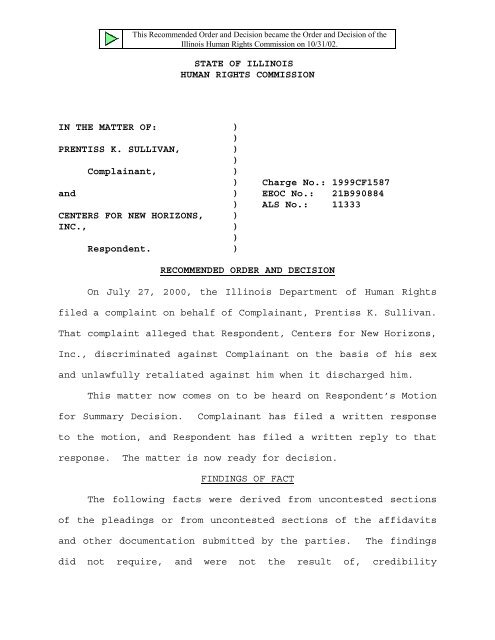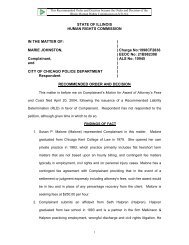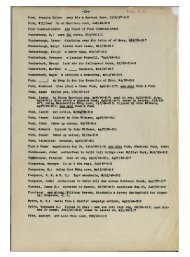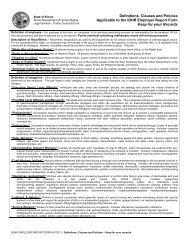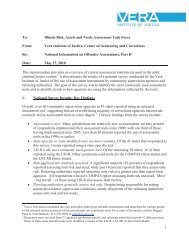Prentiss Sullivan v. Centers for New Horizons, Inc. - State of Illinois
Prentiss Sullivan v. Centers for New Horizons, Inc. - State of Illinois
Prentiss Sullivan v. Centers for New Horizons, Inc. - State of Illinois
Create successful ePaper yourself
Turn your PDF publications into a flip-book with our unique Google optimized e-Paper software.
7. For 1999, Respondent was required to enroll twentyclients in Complainant’s program during the first quarter <strong>of</strong> theyear.8. Respondent’s contracts with the City <strong>of</strong> Chicagorequired that Respondent provide appropriate documentation <strong>of</strong> theservices provided.9. When Complainant transferred to WCI, the director <strong>of</strong>WCI was Judith Walker.10. In July <strong>of</strong> 1998, the City <strong>of</strong> Chicago auditedComplainant’s program and determined that the program was not incompliance with the controlling contract.11. In January <strong>of</strong> 1999, the City <strong>of</strong> Chicago determined thatComplainant’s program had “never operated during the contractyear.”12. After his transfer to WCI, Complainant was the onlyperson who worked on his program.13. In early January, 1999, Ethelyn Taylor becameComplainant’s immediate supervisor.14. When Taylor asked Complainant to show her his program’srecords and files, he told her that he had no records and did nowork.15. On January 29, 1999, Judith Walker recommended thatComplainant be discharged. Jamel Magee, Respondent’s humanresources administrator, overruled that recommendation. Mageenoted that Complainant had been with Respondent <strong>for</strong> years and she3
wanted to give him some time to adjust to his new supervisor.16. On January 14, 1999, Complainant filed a charge <strong>of</strong>discrimination with the <strong>Illinois</strong> Department <strong>of</strong> Human Rights(IDHR). That charge alleged that Respondent had discriminatedagainst Complainant in the terms and conditions <strong>of</strong> his employmenton the basis <strong>of</strong> his sex.17. On March 12, 1999, Respondent discharged Complainant.Complainant subsequently amended his charge <strong>of</strong> discrimination toallege sex discrimination and retaliation in regard to thedischarge.18. On July 6, 2000, IDHR dismissed Complainant’s claimregarding unequal terms and conditions <strong>of</strong> employment.Complainant did not appeal that dismissal.CONCLUSIONS OF LAW1. Complainant is an “aggrieved party” as defined bysection 1-103(B) <strong>of</strong> the <strong>Illinois</strong> Human Rights Act, 775 ILCS 5/1-101 et seq. (hereinafter “the Act”).2. Respondent is an “employer” as defined by section 2-101(B)(1)(a) <strong>of</strong> the Act and is subject to the provisions <strong>of</strong> theAct.3. Complainant cannot establish a prima facie case <strong>of</strong> sexdiscrimination against him.4. Complainant can establish a prima facie case <strong>of</strong>retaliation against him.5. Respondent can articulate a legitimate, non-4
The method <strong>of</strong> proving such allegations is well established.First, Complainant must establish a prima facie showing <strong>of</strong>discrimination. If he does so, Respondent must articulate alegitimate, non-discriminatory reason <strong>for</strong> its actions. ForComplainant to prevail, he must then prove that Respondent’sarticulated reason is pretextual. Zaderaka v. Human RightsCommission, 131 Ill. 2d 172, 545 N.E.2d 684 (1989). See alsoTexas Dep’t <strong>of</strong> Community Affairs v. Burdine, 450 U.S. 251 (1981).The complaint raises two theories, sex discrimination andretaliation.The retaliation theory will be considered first.To establish a prima facie case <strong>of</strong> retaliation, Complainantwould have to prove three elements. He must prove 1) that heengaged in a protected activity, 2) that Respondent took anadverse action against him, and 3) that there was a causal nexusbetween the protected activity and Respondent’s adverse action.Carter Coal Co. v. Human Rights Commission, 261 Ill. App. 3d 1,633 N.E.2d 202 (5th Dist. 1994). There is no doubt about thefirst and second elements. The parties agree that Complainantfiled a charge <strong>of</strong> discrimination and that Respondent dischargedhim.There is a dispute, though, about the third element.Respondent maintains that Complainant cannot establish alink between the filing <strong>of</strong> his charge and his discharge.However, the record does not support Respondent’s position.For purposes <strong>of</strong> a prima facie case, a connection can beestablished by showing that there was a relatively short time8
charge.As a result, there is a genuine issue <strong>of</strong> material factregarding the connection between Complainant’s protected act andhis discharge. Thus, it appears that Complainant may well beable to establish a prima facie case <strong>of</strong> retaliation.He was less successful on his claim <strong>of</strong> sex discrimination.To establish a prima facie case <strong>of</strong> sex discrimination in adischarge situation, Complainant would have to prove fourelements.He would have to prove 1) that he is in a protectedclass, 2) that he was meeting Respondent’s reasonableexpectations, 3) that he was discharged, and 4) that similarlysituated persons outside his protected class were not discharged.Yarbrough and Ryder Distribution Resources, D.P.D., ___ Ill. HRCRep. ___, (1988CF2549, October 5, 1992).Complainant clearly canestablish the first and third elements. On the basis <strong>of</strong> theexisting record, though, it is clear that he cannot establisheither <strong>of</strong> the remaining two elements.Certainly, Complainant was not meeting Respondent’sreasonable expectations.On two separate occasions, in July <strong>of</strong>1998 and again in January <strong>of</strong> 1999, the City <strong>of</strong> Chicago found thatComplainant’s program was not in compliance with its contract.In fact, in January <strong>of</strong> 1999, the city found that Complainant’sprogram had “never operated during the contract year.” Inresponse, Complainant does not maintain that he was incompliance. Instead, he claims that he would have been incompliance if Respondent had provided him the proper support.In10
other words, Complainant does not contest that his program didnot comply with its contract. Since operating within thecontract’s terms is a reasonable expectation <strong>for</strong> Respondent tohave, Complainant’s concession that he did not meet those termsis fatal to his attempts to establish the second element <strong>of</strong> hisprima facie case.The fact that Complainant worked <strong>for</strong> Respondent <strong>for</strong> years isinsufficient to raise a genuine issue <strong>of</strong> fact on that element.After all, there is no allegation that Respondent was aware <strong>of</strong>the shortcomings <strong>of</strong> Complainant’s program until the City <strong>of</strong>Chicago conducted its audit.Similarly, it means nothing that Complainant’s <strong>for</strong>mersupervisor, Gregory Washington, wrote a letter <strong>of</strong> reference <strong>for</strong>him.The letter in question is dated September 22, 1998, be<strong>for</strong>ethe city found that Complainant’s program was not operating.Moreover, the letter itself indicates that that Washington leftRespondent’s employ in May <strong>of</strong> 1995, long be<strong>for</strong>e the auditproblems surfaced. There is no indication whatsoever thatRespondent ever believed that Complainant’s per<strong>for</strong>mance metRespondent’s expectations after the results <strong>of</strong> that audit werereleased.Thus, at the time <strong>of</strong> the discharge (and apparently <strong>for</strong>quite some time be<strong>for</strong>e that), Complainant was not meeting hisemployer’s expectations.Finally, it should be noted that Complainant’s immediatesupervisor in 1999, Ethelyn Taylor, claims that, when she asked11
Complainant to show her his program’s records and files, he toldher that he had no records and did no work.Because he has notdenied making those statements, Taylor’s statement standsunrebutted and must be accepted as true. See Koukoulomatis v.Disco Wheels, 127 Ill. App. 3d 95, 468 N.E.2d 477 (1st Dist.1984). In sum, it is overwhelmingly clear that Complainantcannot establish the second element <strong>of</strong> his prima facie case.Complainant fares no better with regard to the fourthelement.There is nothing in the record to raise a genuine issue<strong>of</strong> fact on whether similarly situated women were retained instead<strong>of</strong> discharged.In the affidavit submitted with his response to Respondent’smotion, Complainant lists two women whom he believes were treatedbetter than he was. Most <strong>of</strong> that in<strong>for</strong>mation, though, isinadmissible.Complainant alleges that Chrystal Kyles was <strong>of</strong>fered a lesserposition after being removed <strong>for</strong> failure to meet contractguidelines.He also alleges that Kyles turned down that lesserposition and was then allowed to resign in lieu <strong>of</strong> discharge.Complainant also alleges that Carol Aka was <strong>of</strong>fered a lesserposition be<strong>for</strong>e being allowed to resign.The affidavit gives noindication <strong>of</strong> the source <strong>of</strong> Complainant’s in<strong>for</strong>mation.With regard to motions <strong>for</strong> summary decision, Supreme CourtRule 191 requires affidavits to be “made on the personalknowledge <strong>of</strong> the affiants.” There is nothing in Complainant’s12
affidavit to indicate how he knows about Kyles’s and Aka’sdepartures. Certainly, there is no pro<strong>of</strong> <strong>of</strong> “personalknowledge.” A document attached to Complainant’s affidavitestablishes that Kyles was demoted, but does not explain thereasoning.Another document states that Aka resigned, but doesnot state either that she was <strong>of</strong>fered another position or thatthe resignation was a <strong>for</strong>ced alternative to discharge.In short,Complainant fails to <strong>of</strong>fer admissible evidence to establish agenuine issue <strong>of</strong> material fact on whether Kyles and Aka weresimilarly situated.It should be noted that Complainant’s brief invests a greatdeal <strong>of</strong> space discussing his perception that women were treatedbetter than he was in the basic terms and conditions <strong>of</strong>employment.On the facts <strong>of</strong> the instant case, that discussion is<strong>of</strong> no value in establishing a case <strong>of</strong> sex discrimination.Complainant’s initial charge <strong>of</strong> discrimination alleged thatRespondent had discriminated against Complainant in the terms andconditions <strong>of</strong> his employment on the basis <strong>of</strong> his sex. On July 6,2000, IDHR dismissed the claim regarding unequal terms andconditions. Complainant did not appeal that dismissal. Thatclaim is there<strong>for</strong>e barred by the doctrine <strong>of</strong> res judicata.SeeSteele and Venture Stores, <strong>Inc</strong>., ___ Ill. HRC Rep. ___,(1986SF0276, August 2, 1996). If there was no substantialevidence to support the allegations, mere repetition <strong>of</strong> thoseallegations is insufficient to raise a genuine issue <strong>of</strong> material13
fact. Moreover, the fact that Complainant’s supervisors werewomen is meaningless. To find otherwise would be to call intoquestion every personnel decision made by every supervisor,provided that the supervisor and the affected employee were fromdifferent demographic groups. In sum, Complainant failed toestablish the fourth element <strong>of</strong> his prima facie case.The failure to establish a prima facie case, in and <strong>of</strong>itself, is not fatal to Complainant’s claim.In its submissions,Respondent articulated a legitimate, non-discriminatory reason<strong>for</strong> its actions.Once such a reason is articulated, there is noneed <strong>for</strong> a prima facie case. Instead, at that point, thedecisive issue in the case becomes whether the articulated reasonis pretextual. Clyde and Caterpillar, <strong>Inc</strong>., 52 Ill. HRC Rep. 8(1989), aff’d sub nom Clyde v. Human Rights Commission, 206 Ill.App. 3d 283, 564 N.E.2d 265 (4th Dist. 1990).At this point in the discussion, Complainant’s two theoriesconverge. Respondent’s articulated reason applies to both thesex discrimination and the retaliation claims. Simply put,Respondent’s articulated reason is that Complainant wasdischarged <strong>for</strong> poor per<strong>for</strong>mance.The most important per<strong>for</strong>mancewas that Complainant failed to operate his program in compliancewith the contract with the City <strong>of</strong> Chicago.To justify denial <strong>of</strong> Respondent’s motion, Complainant wouldhave to raise a genuine issue <strong>of</strong> material fact on the issue <strong>of</strong>pretext. Pettis and McDonald’s Corp., ___ Ill. HRC Rep. ___,14
(1991CF2143, October 10, 2001).He failed to meet that burden.As discussed earlier, Complainant conceded that his programwas not in compliance with the city’s contract. He did notcontest the city’s audit findings, not even the finding that hisprogram failed to operate during a year <strong>of</strong> the contract. He<strong>of</strong>fered nothing to indicate any improvement in his per<strong>for</strong>manceafter the audit findings were announced. Moreover, he <strong>of</strong>ferednothing to indicate that Respondent did not really believe hisper<strong>for</strong>mance was a severe problem.Accordingly, it is impossibleto find fault with Respondent’s assertion that his per<strong>for</strong>mancewas unacceptable when he was fired.In other words, there is no evidence whatsoever to suggestthat Respondent’s articulated reason is pretextual.Thus, thereis no genuine issue <strong>of</strong> material fact on the issue <strong>of</strong> pretext andRespondent’s motion <strong>for</strong> summary decision should be granted.RECOMMENDATIONBased upon the <strong>for</strong>egoing, there are no genuine issues <strong>of</strong>material fact regarding pretext and Respondent is entitled to arecommended order in its favor as a matter <strong>of</strong> law.Accordingly,it is recommended that the complaint in this matter be dismissedin its entirety, with prejudice.HUMAN RIGHTS COMMISSIONENTERED: July 2, 2002BY:____________________________MICHAEL J. EVANSADMINISTRATIVE LAW JUDGEADMINISTRATIVE LAW SECTION15


